16 Jul 2024 - {{hitsCtrl.values.hits}}
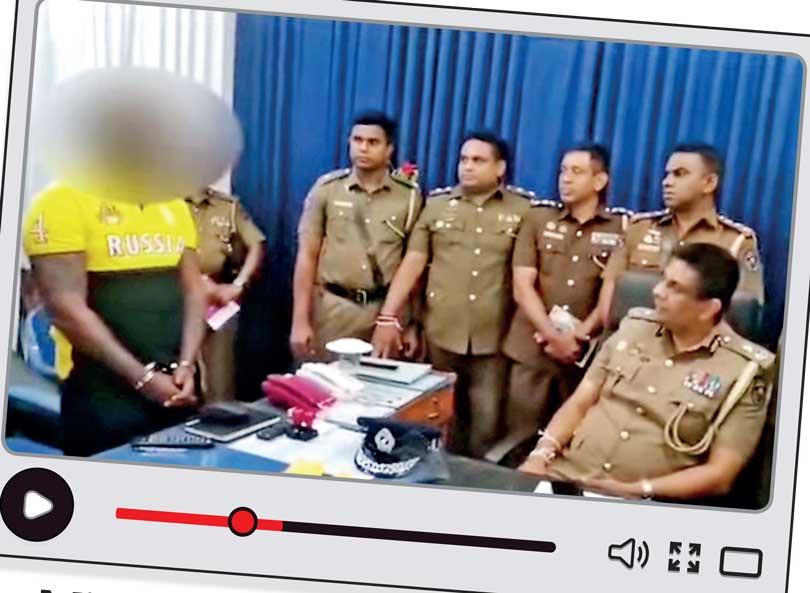
The legal fraternity has condemned the releasing of the footage of a person being questioned by the police in connection with the shooting of a former club owner at a tattoo shop to the media. They affirm that investigations into the shooting incident can be crippled as a result
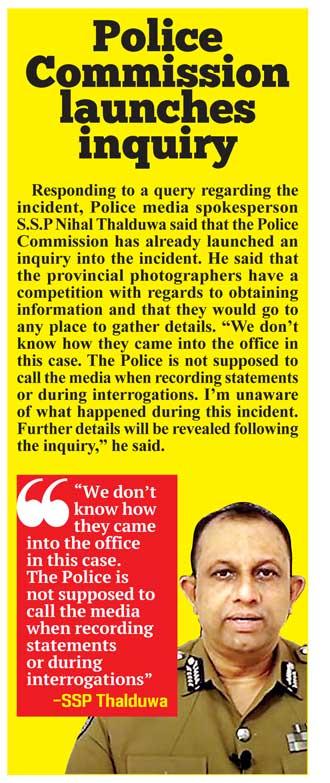 The Sri Lanka Police came under scrutiny for allowing the media to release sensitive information relating to the assassination of a night club owner during the confession made by the owner of the tattoo shop. On numerous instances, CCTV footage and other sensitive information are leaked to the media; even before the law enforcement authorities conclude their investigations. On Friday, Justice Minister Wijayadasa Rajapaksha slated the cops for releasing footage obtained during the interrogation. He said in Parliament that it is a clear violation of the law and that the services of police officers- involved in this interrogation- should be suspended.
The Sri Lanka Police came under scrutiny for allowing the media to release sensitive information relating to the assassination of a night club owner during the confession made by the owner of the tattoo shop. On numerous instances, CCTV footage and other sensitive information are leaked to the media; even before the law enforcement authorities conclude their investigations. On Friday, Justice Minister Wijayadasa Rajapaksha slated the cops for releasing footage obtained during the interrogation. He said in Parliament that it is a clear violation of the law and that the services of police officers- involved in this interrogation- should be suspended.
A case of contempt of court
Immediately after the footage was released to the media, the legal fraternity underscored that it’s not only contempt of court, but releasing such information to the media makes the arrested person more vulnerable to retaliatory actions by accused parties.
“In any event no confession made to a police officer can be admitted in evidence at a trial as per Section 25 of the Evidence Ordinance,” said President’s Counsel Tirantha Walaliyadda. “Releasing the details of confessions in an ongoing investigation to the public is a contempt of court under English law,” said Walaliyadda.
He further said that the Police simply cannot treat a suspect like walking on eggshells. “They can be dangerous people. But they should be informed of their rights in terms of the Code of Criminal Procedures 110(2) where they have to answer truthfully any question put to them other than those which tend to incriminate them,” he said.
Even though the Police Commission issued a red 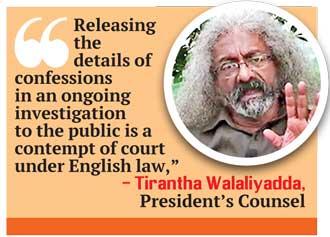 alert to Police officers to refrain from divulging interrogations and interviews, Walaliyadda said that this notice came far too late in the day for the arrested person. “The damage and prejudice has already been caused. His status on the presumption of innocence is now in jeopardy,” he added.
alert to Police officers to refrain from divulging interrogations and interviews, Walaliyadda said that this notice came far too late in the day for the arrested person. “The damage and prejudice has already been caused. His status on the presumption of innocence is now in jeopardy,” he added.
CPRP to file FR case
The Committee for Protecting the Rights of Prisoners (CPRP) condemned the actions of the Police and said that this incident is a serious violation of the suspects’ fundamental rights. There are provisions in the Code of Criminal Procedure apart from recommendations issued by the Human Rights Commission and directives issued by the Inspector General of Police which clearly state that sensitive information pertaining to a case should not be released to the media at any point.
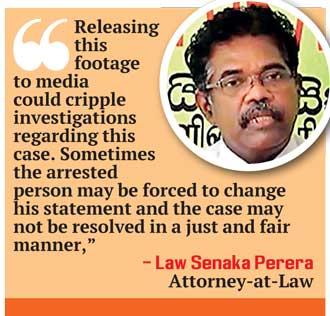 “This entire incident was aired on TV like a thriller movie,” said Attorney-at-Law Senaka Perera. “Releasing this footage to media could cripple investigations regarding this case. Section 13 (5) of the Constitution states that “any person shall be presumed innocent until he is proved guilty”. Sometimes the arrested person may be forced to change his statement and the case may not be resolved in a just and fair manner,” said Perera.
“This entire incident was aired on TV like a thriller movie,” said Attorney-at-Law Senaka Perera. “Releasing this footage to media could cripple investigations regarding this case. Section 13 (5) of the Constitution states that “any person shall be presumed innocent until he is proved guilty”. Sometimes the arrested person may be forced to change his statement and the case may not be resolved in a just and fair manner,” said Perera.
He further said that perhaps there could be an influential person behind this case and suspects that this could be the reason why the cops acted in this manner. “The suspect has already been criminalised in front of society. This is quite an unfortunate turn of events. It seems that the Police haven’t adhered to guidelines issued in terms of protecting a witness/ suspect,” said Perera.
He further said that the CPRP will be filing a fundamental rights case on behalf of the tattoo shop owner.
Suspect/witness exposed to vulnerability
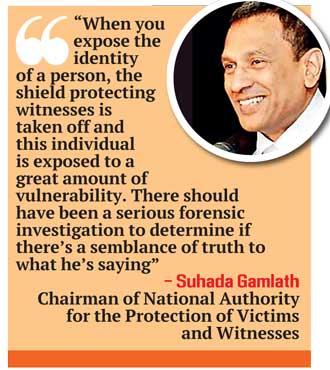 In his comments to the Daily Mirror, Former Solicitor General Suhada Gamlath and Chairman of the National Authority for the Protection of Victims and Witnesses said that the witness has been implicating some other people who are fairly powerful. “When you expose the identity of a person, the shield protecting witnesses is taken off and this individual is exposed to a great amount of vulnerability. There should have been a serious forensic investigation to determine if there’s a semblance of truth to what he’s saying. The witness is certainly vulnerable in this case if persons affected by what he’s saying are powerful people. This is why important and controversial evidence need to be recorded,” said Gamlath.
In his comments to the Daily Mirror, Former Solicitor General Suhada Gamlath and Chairman of the National Authority for the Protection of Victims and Witnesses said that the witness has been implicating some other people who are fairly powerful. “When you expose the identity of a person, the shield protecting witnesses is taken off and this individual is exposed to a great amount of vulnerability. There should have been a serious forensic investigation to determine if there’s a semblance of truth to what he’s saying. The witness is certainly vulnerable in this case if persons affected by what he’s saying are powerful people. This is why important and controversial evidence need to be recorded,” said Gamlath.
According to Section 127 of the Code of Criminal Procedure, if the evidence is crucial for the purpose of conducting an investigation, the arrested person or witness should be produced before a competent magistrate. “The whole purpose of an investigation is to follow due process of conducting an investigation,” he added. “The Police should know to conduct a proper clinical and forensic investigation. The Victim and Witness Protection Authority, the Police and the Attorney General’s Department are players in a game where justice is done by following due process.
“Everything from how a statement should be recorded to how it should be recorded in the record book, how the magistrate should be asked to help are laid out in this piece of legislature. Strict adherence to these provisions is sine qua non of the preservation of the law. Why should we deviate from the law? Who has given the orders to do so? Why do we act arbitrarily when conducting investigations,” the former solicitor general questioned.
He also explained new features that have been included in the Assistance To and Protection of Victims of Crime and Witnesses Act No. 10 of 2023 (Victim and Witness Protection Act) including serious mechanisms to protect victims and witnesses while complying with international standards.
With regards to Rights and Entitlements of a witness, Section 9 of the Act says that a witness shall always be treated with respect to his dignity and privacy in a manner that is fair in all circumstances. It further states that the state apparatus involved in the case should provide protection for the witness. The Section further states that a witness shall be entitled to provide any information or make a statement freely and voluntarily to any court, Commission or law enforcement authority relating to the alleged commission of an offence.
“Where is the free and voluntary narration of information when someone is in Police custody? If there is any evidence regarding a crime the arrested person should be produced before a magistrate in a concealed manner to record what this person has to say in a fearless and safe atmosphere. This has been an age old law,” said Gamlath.
Section 9 (5) states that a witness shall be entitled to protection against any real or possible harm, threat, intimidation, reprisal or retaliation resulting from such witness testifying before a public officer. “Therefore it looks like all these provisions have been violated,” he underscored.
Section 28 (1) G states that the nature of protection that may be provided to any victim of crime or witness under this Part of the Act may include the adoption of necessary measures to prevent the victim of crime or witness from being harassed, intimidated, coerced or influenced by encountering the presence of the accused at the venue of the trial, investigation or inquiry. “Likewise, there’s a huge protection mechanism for victims and witnesses. On the other hand there are norms, morality and ethics of conducting an investigation. We shouldn’t be exposing a witness by exposing him to vulnerability,” he said.
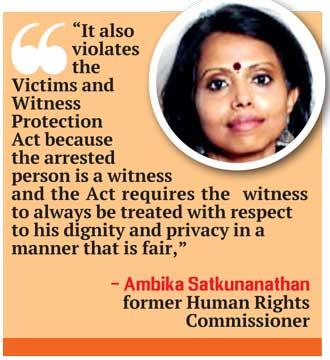 Gamlath further said that there has to be a certain degree of restraint that needs to be observed by the mass media when providing information about these persons to protect them.
Gamlath further said that there has to be a certain degree of restraint that needs to be observed by the mass media when providing information about these persons to protect them.
He further said that Section 34 of the Act includes special measures for vulnerable victims of crime and witnesses which states that vulnerable victims should be given maximum protection.
Increasing lawlessness
Apart from the fact that this incident is contempt of court, exposing a confession made by a person who has been arrested undermines his rights. “The release of the interrogation video by the police is unprofessional, undermines the due process, rights of the arrested person and places his safety in jeopardy,” said former Human Rights Commissioner Ambika Satkunanathan. “It also violates the Victims and Witness Protection Act because the arrested person is a witness and the Act requires the witness to always be treated with respect to his dignity and privacy in a manner that is fair”. According to the Act the police have critical duties with regard to protecting witnesses, but in this instance it is the police that have jeopardised the witness’s safety. So how can they be trusted to uphold the provisions of the Act ," she questioned.
Satkunanathan further said that the government and specifically the Minister of Public Security and the IGP have repeatedly declared they are going to eradicate crime and make the country safer. “Yet their actions are only increasing insecurity for everyone because, what we see is that even though they have a duty to abide by the Constitution and respect the law as public officials, they are consistently violating the law. When they violate the law how can they expect or demand that others abide by the law? Their actions only increase lawlessness,” she opined.
27 Dec 2024 2 hours ago
27 Dec 2024 2 hours ago
27 Dec 2024 3 hours ago
27 Dec 2024 3 hours ago
27 Dec 2024 4 hours ago